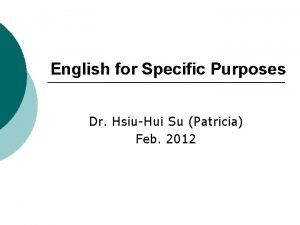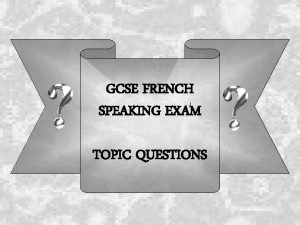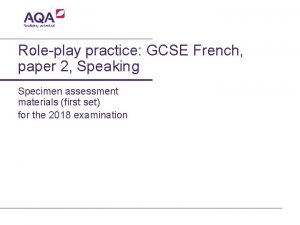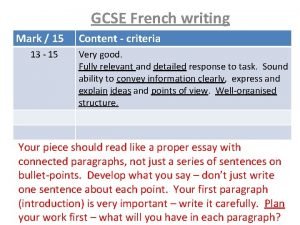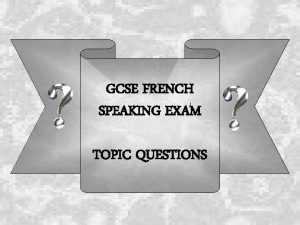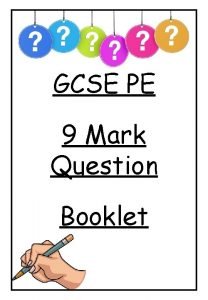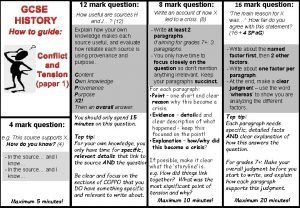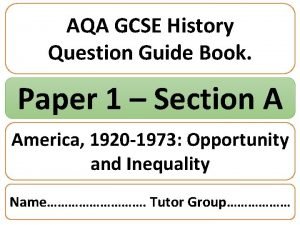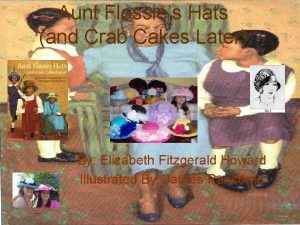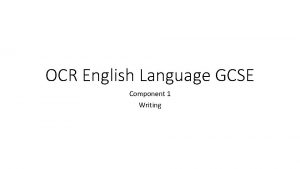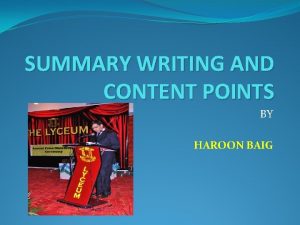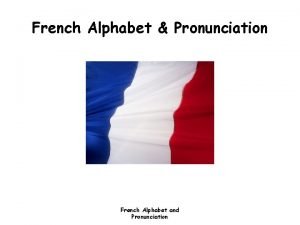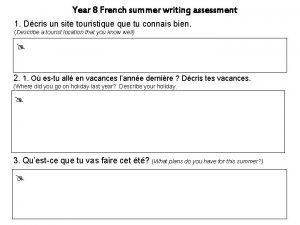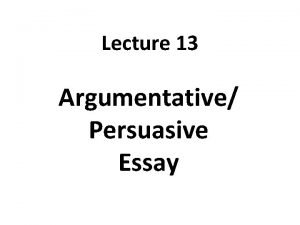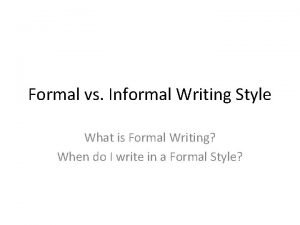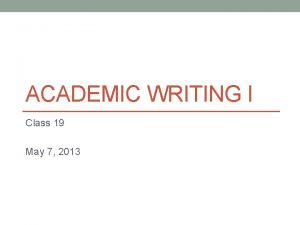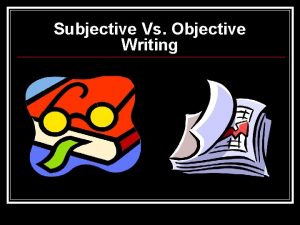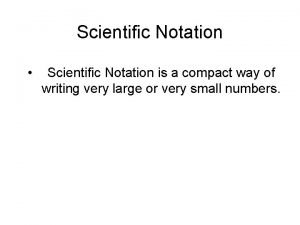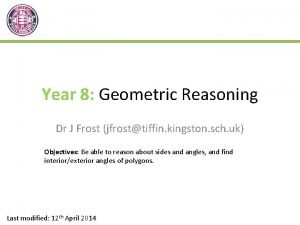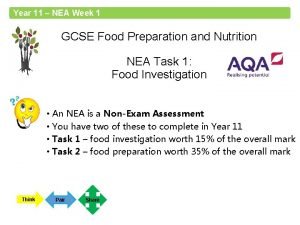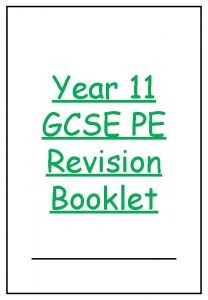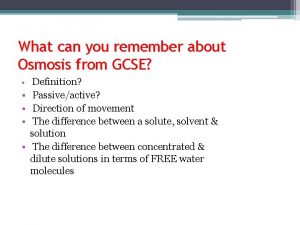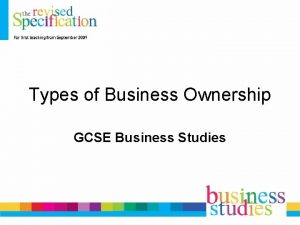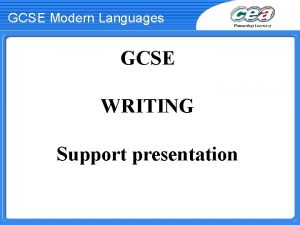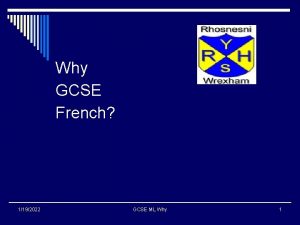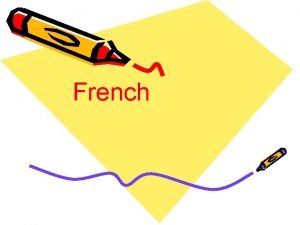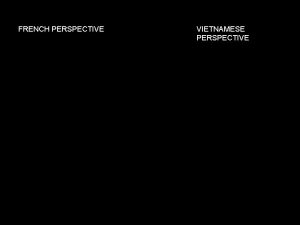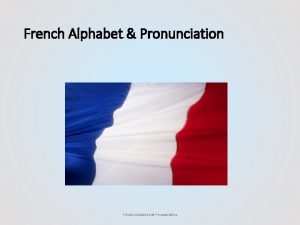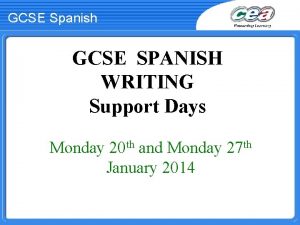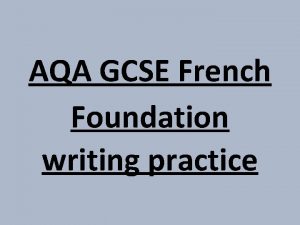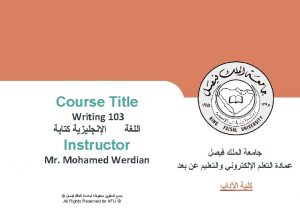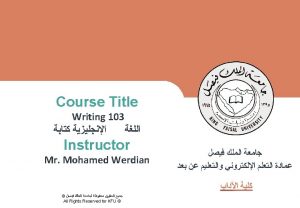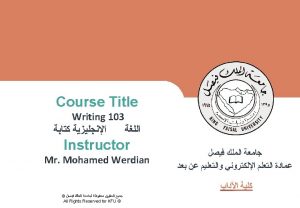GCSE French writing Mark 15 13 15 Content













































- Slides: 45

GCSE French writing Mark / 15 13 - 15 Content - criteria Very good. Fully relevant and detailed response to task. Sound ability to convey information clearly, express and explain ideas and points of view. Well-organised structure. Your piece should read like a proper essay with connected paragraphs, not just a series of sentences on bullet-points. Develop what you say – don’t just write one sentence about each point. Your first paragraph (introduction) is very important – write it carefully. Plan your work first – what will you have in each paragraph?

GCSE French writing Mark / 15 10 - 12 Content - criteria Good. Mostly relevant response to task and shows ability to convey a lot of information clearly, express and explain ideas and points of view. Relevance – keep referring to the title, bullet-points and your plan to make sure you are keeping to the point. An account of a shopping trip is not as relevant to holidays as a visit to a local market. Do not write the whole piece in English and then try to translate it – you won’t be able to. GCSE writing - how to score highly and errors to avoid

GCSE French writing Mark / 15 7 -9 Content - criteria Sufficient. Response to task is generally relevant with quite a lot of information clearly communicated. Points of view are expressed and ideas are developed. You must include at least 3 or 4 justified points of view – this means giving your opinion and a reason for it, eg J’aime aller en France parce qu’il fait du soleil, j’aime la nourriture et je trouve les plages très belles. Only one point of view limits your content mark to 9/15. GCSE writing - how to score highly and errors to avoid

GCSE French writing Mark / 10 Range of language 9 - 10 Wide variety of appropriate vocabulary and structures. More complex sentences are handled with confidence and verb tenses are used successfully. Complex sentences means using several fancy structures such as après avoir (mangé), je viens de +infinitive, avant de +infinitive etc. It also means using linking words – keep a list of structures and connectives in front of you as you write and make sure you use plenty of both. GCSE writing - how to score highly and errors to avoid

GCSE French writing Mark / 10 Range of language 7 -8 Good variety of appropriate vocabulary and structures used. More complex sentences are attempted and are mostly successful. Make sure you have used at least three different tenses – and the verbs must be correct! Vary your sentence length – some longer, some shorter, not all starting with Je. Remember to include who – what – when – where – why. Use time phrases and say where things happened. GCSE writing - how to score highly and errors to avoid

GCSE French writing Mark / 10 Range of language 5 -6 Some variety of vocabulary and structures used, including attempts at longer sentences using appropriate linking words which are sometimes successful. Make sure you use a variety of words with roughly the same meaning, eg several different ways of saying something was good / fun / awful, or ‘je suis allée en France pendant les vacances / j’ai passé les vacances en France’. Connectives!! GCSE writing - how to score highly and errors to avoid

GCSE French writing Mark /5 5 Accuracy Largely accurate, although there may still be some errors, especially in attempts at more complex sentences. Verbs and tense formations are secure. Accuracy underpins everything. Make sure you learn how to form verb tenses and apply your learning carefully in your writing. Check using verb tables. To get 5 / 5 for accuracy, your verbs must be right!! GCSE writing - how to score highly and errors to avoid

GCSE French writing Mark /5 4 Accuracy Generally accurate with errors occurring in attempts at more complex sentences. Verb and tense formations are usually correct. All your basic phrases need to be correct to score 4 / 5. Check your spellings as you prepare your task and learn them carefully. Accents are particularly important. You need at least two complex sentences to get more than 4 accuracy marks. GCSE writing - how to score highly and errors to avoid

GCSE French writing Mark /5 3 Accuracy More accurate than inaccurate. Verb forms and tense formations are sometimes unsuccessful. The intended meaning is clear. Sometimes is not frequently. Check whether verbs are avoir or être in the past. Do they need to agree? Have you got the correct past participle? Are you using the right tense? GCSE writing - how to score highly and errors to avoid

GCSE French writing Mark / 5 2 Accuracy Many errors which often impede communication. Verb forms are rarely accurate. If the person marking your work cannot understand what you are saying, then errors impede communication. When you are preparing your task, leave the work for a while and then come back and look for errors – they should be more obvious after a break. Use a dictionary to check spellings, genders etc. GCSE writing - how to score highly and errors to avoid

GCSE French writing Mark / 5 1 Accuracy Limited understanding of the most basic linguistic structures. Frequent errors regularly impede communication. These count as basic errors when occurring in common words – mis-spellings, accents not used correctly, wrong gender, wrong adjective agreement, wrong verb ending for person doing verb, using foreign (eg English or Spanish) word. GCSE writing - how to score highly and errors to avoid

GCSE French writing NEVER use Google Translate, even to check your work – it cannot be trusted to be correct GCSE writing - how to score highly and errors to avoid

GCSE French writing - spelling If you’re not sure how to spell a word, look it up! Be especially careful with accents and apostrophes; these are basic errors - è c’ etait, é ô Tres, hotel, que‘ il, j e‘irai, j’ai mange 04/03/2021 GCSE writing - how to score highly and errors to avoid é 13

GCSE French writing - spelling L’anneeé dernierè e interes é ante sant(e) C’était intéressant / l e film est intéressant / l’église était intéressante delici é eux ous / euse C’était délicieux / le repas était délicieux / la nourriture française est délicieuse 04/03/2021 GCSE writing - how to score highly and errors to avoid 14

GCSE French writing - spelling activit iés par exaeemple ennuyeux (-euse for fem. ) nul (la piscine était nulle) randonnées – walks restaurant(s), nourriture 04/03/2021 GCSE writing - how to score highly and errors to avoid 15

GCSE French writing – genders and agreements Make sure you know whether nouns (things) are masculine or feminine, as it affects the adjectives you use to describe them. Descriptions are important in your writing – make sure you include at least one. La tour Eiffel est grande – the tower Le tour de France – the tour round somewhere L’eau était froide – water is feminine Les vacances étaient géniales – holiday(s) = F Pl Il y avait une grande piscine et deux grands bars C’est / c’était / ce sera take M sing adjectives 04/03/2021 GCSE writing - how to score highly and errors to avoid 16

GCSE French writing – genders and agreements Be careful with food which is delicious etc or good / bad for your health – the words délicieux etc and bon / mauvais will need to agree with the food eg Le fromage français est délicieux La viande est bonne pour la santé en modération Les croissants ne sont pas bons pour la santé Les glaces sont mauvaises pour les dents 04/03/2021 GCSE writing - how to score highly and errors to avoid 17

GCSE French writing - spelling Copy out the following, correcting the spelling where necessary: L’anne dernier jai fais beacoup d’activities; por example, je suis allée au cinema ou j’ai vu un film interresante qui s’appelait Quartet. Avec ma familie jai fait des randones à la campange mais jai les trouvées ennyeux et nul. Jai aime la noriture italien, surtout les glaces qui était delicious, mais elles sont mal pour la sante. 26 spelling errors, and one example of incorrect word order 04/03/2021 GCSE writing - how to score highly and errors to avoid 18

GCSE French writing - spelling Copy out the following, correcting the spelling where necessary: L’année dernière j’ai fait beaucoup d’activités; par exemple, je suis allée au cinéma où j’ai vu un film intéressant qui s’appelait Quartet. Avec ma famille j’ai fait des randonnées à la campagne mais je les ai trouvées ennuyeuses et nulles. J’ai aimé la nourriture italienne, surtout les glaces qui étaient délicieuses, mais elles sont mauvaises pour la santé. 04/03/2021 GCSE writing - how to score highly and errors to avoid 19

GCSE French writing – descriptions To score highly for content you need to include some descriptions eg of where you stayed Descriptions in the past will usually be in the imperfect tense, Eg nous sommes restés dans un hôtel cinq étoiles qui était très grand et confortable. Il y avait une belle piscine et deux restaurants où nous mangions chaque soir. Il y avait aussi un gymnase, mais je n’y suis pas allée. J’ai partagé une chambre avec ma soeur, pourtant ce n’était pas un problème parce que la chambre était spacieuse et donc nous avions suffisamment de place. 04/03/2021 GCSE writing - how to score highly and errors to avoid 20

GCSE French writing – descriptions Write a four-sentence description of the town you stayed in. Make sure you do not just put a LIST of amenities; say • what it was like (size, age), • what was there • what you did at the places ) what tense will you use • what you thought of it. ) for these? Now write another description of a town you will go to next year – how will you express an opinion about it? 04/03/2021 GCSE writing - how to score highly and errors to avoid 21

GCSE French writing – to / at / in a place à en au(x) – which do you use when? ? Use à for to / at / in a town or city J’habite à Manchester, La T. E. est à Paris Use en for to / at / in a feminine country J’ai passé mes vacances en Italie, Paris est en France Use au(x) for to / at / in masc / plural countries Je vais aller au Canada, NY est aux États-Unis 04/03/2021 GCSE writing - how to score highly and errors to avoid 22

GCSE French writing – to / at / in a place En is also used for by a means of transport, but use à if you provide the power – en voiture but à vélo, à pied Dans means in as inside – a room, box, a book, a plane Nous avons voyagé en Espagne en avion. C’était rapide, mais malheureusement mon frère a été malade dans l’avion. Au, à la, à l’ and aux mean to the – je suis allée au cinéma, aux magasins, à l’ église 04/03/2021 GCSE writing - how to score highly and errors to avoid 23

GCSE French writing – to / at / in a place À en au Paris vélo pied Venise Espagne Portugal cinéma 04/03/2021 aux Allemagne Écosse Trafford Centre magasins voiture GCSE writing - how to score highly and errors to avoid avion États-Unis 24

GCSE French writing – to / at / in a place Translate these sentences into French: I went on holiday to France Je suis allée en vacances en France We travelled by plane Nous avons voyagé en avion We stayed in a hotel in Nîmes in France Nous sommes restés dans un hôtel à Nîmes en France I went to the shops by bike Je suis allée aux magasins à vélo I’m going to go to the shops in New York in the USA Je vais aller aux magasins à NY aux États-Unis GCSE writing - how to score highly and 04/03/2021 errors to avoid 25

GCSE French writing –lots, very or too? Remember that lots of is almost always beaucoup de / d’ – Beaucoup des means lots of the Learn to spell très and remember it means very C’était très drôle Trop means too, trop de means too much or too many… Il faisait trop froid – it was too cold C’était trop cher – it was too expensive Il y avait trop de gens – there were too many people La robe coûtait trop d’ argent – the dress cost too much money 04/03/2021 GCSE writing - how to score highly and errors to avoid 26

GCSE French writing –lots, very or too? Try the following: La chambre était très petite The room was very small Il faisait très chaud It was very hot La ville était très tranquille The town was very quiet The food was very tasty La nourriture était très savoureuse It was too hot Il faisait trop chaud The water was too cold L’eau était trop froide The sea was too rough La mer était trop agitée There were too many tourists Il y avait trop de touristes There was too much noise Il y avait trop de bruit 04/03/2021 GCSE writing - how to score highly and errors to avoid 27

GCSE French writing – doing or going? There a number of activities which in English you go but in French you do – make sure you know them! To go shopping – faire des courses / faire du shopping To go for (a) walk – faire une promenade To go riding - faire de l’équitation To go swimming – faire de la natation To go for a picnic – faire un pique-nique To go camping – faire du camping Remember you jouer au sports – j’ai joué au tennis etc 04/03/2021 GCSE writing - how to score highly and errors to avoid 28

GCSE French writing – tenses Remember you need a good variety of tenses in order to score highly – at least three and ideally more. Use: Present to say what happens regularly nowadays – chaque année je passe mes vacances en France Perfect to say what happened in the past – a completed action to which you can give a time / date L’année dernière nous avons passé les vacances en F Imperfect to say what happened regularly / descriptions in past / was …. ing Quand j’étais petite nous passions les vacances en F. Il pleuvait quand nous sommes arrivés 04/03/2021 GCSE writing - how to score highly and errors to avoid 29

GCSE French writing – tenses Try these in French – think about the tense! Last year I went away on holiday with my friends. L’année dernière je suis partie en vacances avec mes copines We stayed in a hotel. Nous sommes restées / avons logé dans un hôtel Every day it was hot, so we went to the beach & we swam. Chaque jour il faisait chaud, donc nous allions à la plage et nous nagions The hotel had a big pool where we only swam once. L’hôtel avait une grande piscine où nous n’avons nagé qu’une fois. Our room was very comfortable and there were 3 beds. Notre chambre était très confortable et il y avait 3 lits. 04/03/2021 GCSE writing - how to score highly and errors to avoid 30

GCSE French writing – tenses Use : Near future (I am going to …) for something which will happen quite soon L’année prochaine je vais passer les vacances en F Future for something further away Quand j’aurai 18 ans je voyagerai en Australie Conditional for I would… Je voudrais voir New York , j’aimerais visiter les pyramides, j’irais à Paris Imperfect and conditional for if something happened, something else would happen Si je gagnais la loterie, j’irais en vacances à Venise 04/03/2021 GCSE writing - how to score highly and errors to avoid 31

GCSE French writing – tenses Try these in French – think about the tense! Next summer I am going to go to Berlin in Germany L’été prochain je vais aller à Berlin en Allemagne After university I will spend a year in the USA Après l’université je passerai un an aux États-Unis My ideal holiday would be in the Caribbean Mes vacances idéales seraient aux Caraïbes If I had lots of money, I would buy lots of presents Si j’avais beaucoup d’argent, j’achèterais beaucoup de cadeaux It would be great if I could go away on my own. Ce serait chouette si je pouvais partir toute seule 04/03/2021 GCSE writing - how to score highly and errors to avoid 32

GCSE French writing – verbs Make sure you know which verbs take être in the perfect – je suis allée, nous sommes restés, elle est venue etc. This is year 8/9 work; if you still find it hard, learn by heart a list of phrases to use. Learn irregular past participles such as j’ai pris, j’ai eu, j’ai bu etc Be careful with the verb devoir – to have to eg j’ai dû rentrer en Angleterre, elle doit rester chez elle, je devrai payer mes vacances moi-même 04/03/2021 GCSE writing - how to score highly and errors to avoid 33

GCSE French writing – verbs Write the following in French: My sister and I went to Nice Ma soeur et moi sommes allées à Nice We took the train I had a head-ache Nous avons pris le train J’ai eu mal à la tête I drank lots of water We saw the Eiffel Tower J’ai bu beaucoup d’eau Nous avons vu la Tour Eiffel We arrived in the evening She wrote a post-card Elle a écrit une carte-postale Nous sommes arrivées le soir I had to go to bed. We had to go home. Nous avons dû rentrer à la maison J’ai dû me coucher 04/03/2021 GCSE writing - how to score highly and errors to avoid 34

GCSE French writing – opinions You need to express opinions and justify them – this means saying WHY you think something. The simplest way is to say “J’aime… parce que…” but there are lots of other ways to express your views as well. J’aime ) + a noun eg les marchés en J’adore ) France car on vend des Je préfère ) produits typiques de la Je m’intéresse à ) région, or an infinitive J’apprécie beaucoup ) or + an infinitive eg ) manger au restaurant en Ce qui m’intéresse, c’est ) France car on Ce qui me plaît, c’est ) peut essayer la nourriture GCSE writing - how to score highly and 04/03/2021 35 errors to avoid régionale

GCSE French writing – opinions Expressing an opinion is not just saying you like something – your opinion might be negative… Je n’aime pas ) Je déteste ) J’ai horreur de(s) ) + noun Je trouve ) eg les églises affreuses(adj) Ce que je déteste, c’est ) or + infinitive Ce qui m’énerve, c’est ) eg visiter les musées car ça ne m’intéresse pas du tout car c’est vraiment ennuyeux. Find some other adjectives as well as intéressant and ennuyeux! 04/03/2021 GCSE writing - how to score highly and errors to avoid 36

GCSE French writing – opinions There are lots of other ways of giving opinions which will earn you range of vocabulary credit: Je pense que ) + noun: Paris est une ville très Je crois que ) intéressante parce qu’il y a Je trouve que ) beaucoup de monuments On dit que ) or + infinitive: visiter Paris, c’est A mon avis ) très intéressant parce que… ** je voudrais / j’aimerais with an infinitive are opinions. VARY the phrases you use and remember to include lots of opinions and reasons for them. 04/03/2021 GCSE writing - how to score highly and errors to avoid 37

GCSE French writing –connectives “More complex sentences” (see range of language) include two or more ideas joined by linking words. You must include some of these, otherwise your style is too basic. Complete the following sentence using the linking words given and a phrase of your own: J’ai aimé notre hôtel… cependant et mais par contre surtout comme donc où même si 04/03/2021 GCSE writing - how to score highly and errors to avoid 38

GCSE French writing –connectives You can also use time phrases to say when things happened; these will lengthen your sentences and you can say D’abord… ensuite…puis…et finalement… Try this in French: First I went into the town and bought some postcards; next I went into a café where I ordered a lemonade and I wrote the postcards, then I went to the Post Office and finally I returned to the hotel. D’abord je suis allée en ville et j’ai acheté des cartes postales; ensuite je suis entrée dans un café où j’ai commandé une limonade et ja’I écrit les cartes, puis je suis allée à la poste et finalement je suis retournée à l’hôtel. GCSE writing - how to score highly and 04/03/2021 errors to avoid 39

GCSE French writing – A* phrases Include some of the following phrases if you are aiming for the top grades: • before doing something (before I / we verbed) avant de + infinitive before eating / I ate – avant de manger before going / we went – avant d’ aller • after doing something (after I / we (had) verbed) après avoir (or après être) + past participle after swimming (I swam)– après avoir nagé after we had eaten – après avoir mangé after arriving (we arrived) – après être arrivés 04/03/2021 GCSE writing - how to score highly and errors to avoid 40

GCSE French writing – A* phrases Try these: before I swam before watching the film avant de nager avant de voir le film before taking the plane avant de prendre l’avion after eating after I had gone out 04/03/2021 avant de rentrer à la maison after doing the shopping après avoir mangé après être sortie before I went home après avoir fait des courses after we had left après être partis GCSE writing - how to score highly and errors to avoid 41

GCSE French writing – A* phrases On doing something By doing something In doing something While doing something… en + present participle On arriving – en arrivant On leaving the hotel – en quittant l’hôtel While skiing – en faisant du ski While swimming – en nageant / faisant de la natation 04/03/2021 GCSE writing - how to score highly and errors to avoid 42

GCSE French writing – A* phrases Try these: We ate breakfast before taking the plane. Nous avons mangé le petit-déjeuner avant de prendre l’avion. After eating breakfast we took the plane. Après avoir mangé le p-d nous avons pris l’avion I lost my money while going into town. J’ai perdu mon argent en allant en ville After I had gone to the beach, I saw a film at the cinema. Après être allée à la plage, j’ai vu un film au cinéma On arriving at the hotel we found our rooms. En arrivant à l’hôtel, nous avons trouvé nos chambres. 04/03/2021 GCSE writing - how to score highly and errors to avoid 43

GCSE French writing Using all these phrases and structures may mean that your work does not sound exactly as it would if you wrote it in English; this doesn’t matter as long as it flows and reads well. The important thing is that you are showing off what you can do in French – you have to impress the examiner with your knowledge of grammar and vocabulary! 04/03/2021 GCSE writing - how to score highly and errors to avoid 44

GCSE French writing Now write yourself a checklist of all the elements you need to get top marks in GCSE writing. Use it as you prepare your controlled assessment pieces. 04/03/2021 GCSE writing - how to score highly and errors to avoid 45
 Carrier content vs real content
Carrier content vs real content Static content vs dynamic content
Static content vs dynamic content Free topic
Free topic Role play french gcse
Role play french gcse Pluperfect tense
Pluperfect tense Gcse french speaking questions
Gcse french speaking questions Aqa gcse pe 9 mark questions
Aqa gcse pe 9 mark questions Gcse history how useful questions
Gcse history how useful questions Gcse pe 9 mark question examples
Gcse pe 9 mark question examples History paper 1
History paper 1 In french in french
In french in french Language book
Language book Content points
Content points Keys to literacy keys to content writing
Keys to literacy keys to content writing Content writing assignment edci 2900
Content writing assignment edci 2900 Formal french greetings
Formal french greetings Homard pronunciation
Homard pronunciation French writing assessment
French writing assessment Narrative quiz
Narrative quiz Persuasive summary
Persuasive summary Impersonal tone
Impersonal tone What is formal writing style
What is formal writing style Similarities of technical writing and academic writing
Similarities of technical writing and academic writing Argumentative essay vs expository essay
Argumentative essay vs expository essay Business writing vs academic writing
Business writing vs academic writing Journalism and literature similarities
Journalism and literature similarities Passive voice ppt
Passive voice ppt Is writing subjective
Is writing subjective How to solve a scientific notation
How to solve a scientific notation Matt damon
Matt damon Aqa food preparation and nutrition nea 2 examples
Aqa food preparation and nutrition nea 2 examples Gcse pe revision booklet
Gcse pe revision booklet Edexcel gcse art
Edexcel gcse art Why is the crucifixion important gcse
Why is the crucifixion important gcse Iamis structures
Iamis structures Hypotonic definition biology gcse
Hypotonic definition biology gcse Venn diagrams gcse
Venn diagrams gcse Edexcel gcse english literature
Edexcel gcse english literature Private limited company gcse business
Private limited company gcse business Trigonometry gcse questions
Trigonometry gcse questions Tree diagrams gcse
Tree diagrams gcse Ocr
Ocr Pixl knowit gcse chemistry quantitative
Pixl knowit gcse chemistry quantitative Combined science grade boundaries
Combined science grade boundaries Gcse nedir
Gcse nedir Average speed gcse maths
Average speed gcse maths
